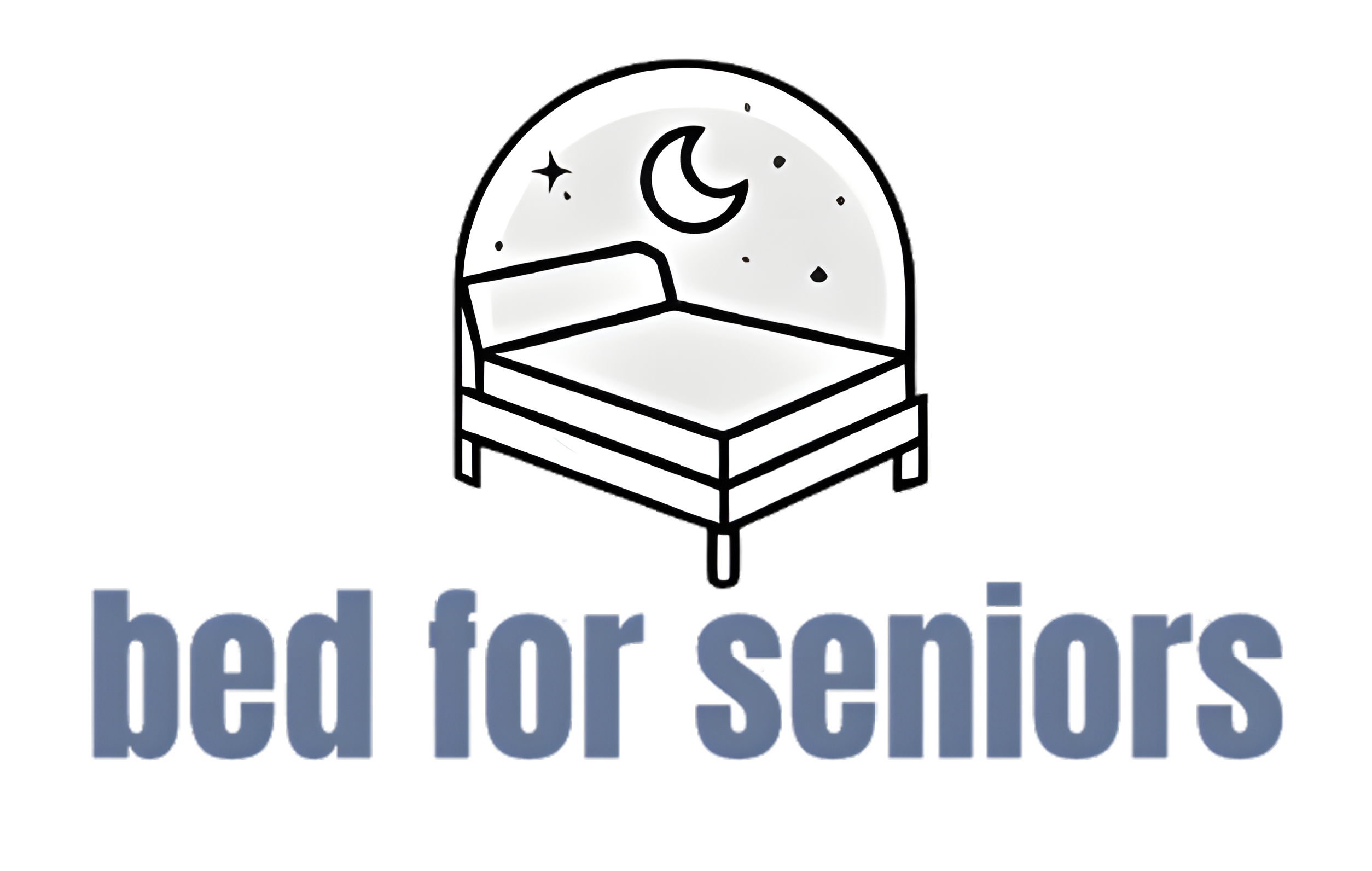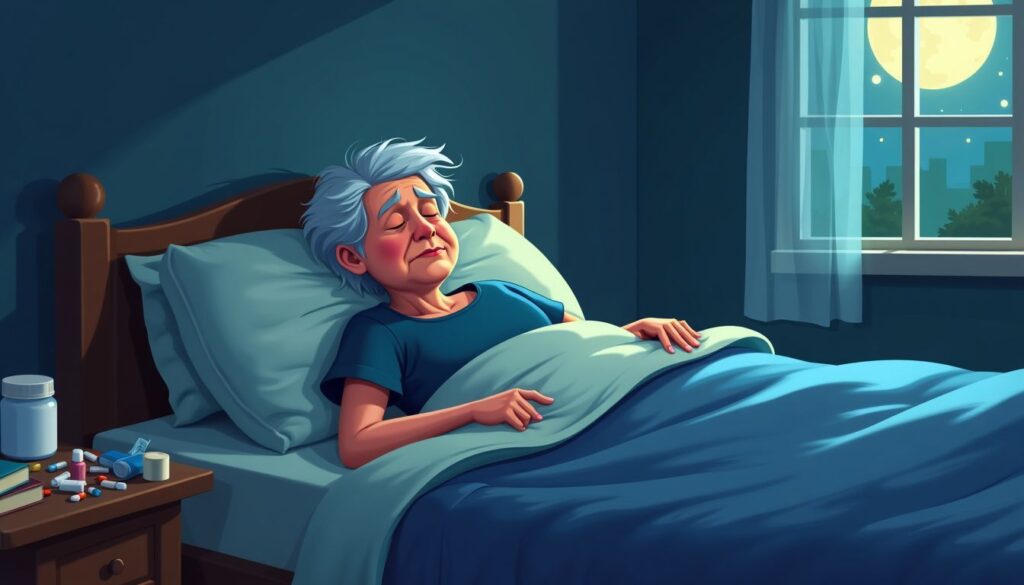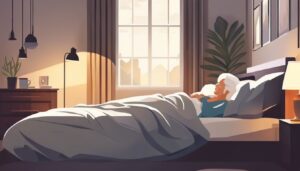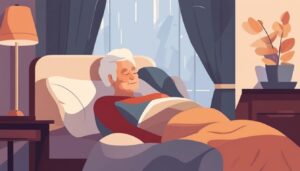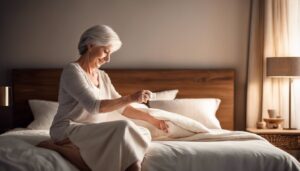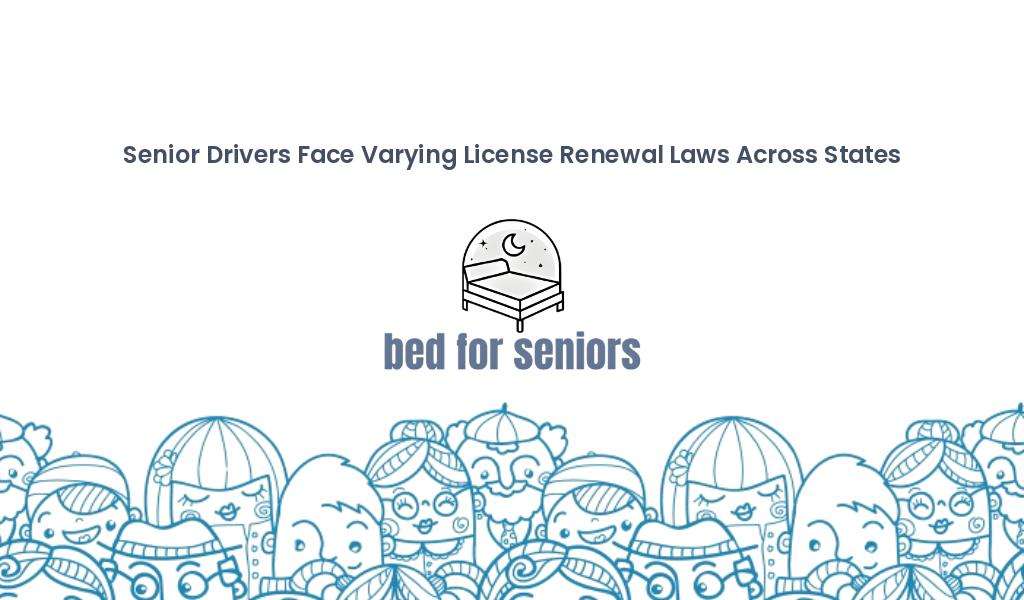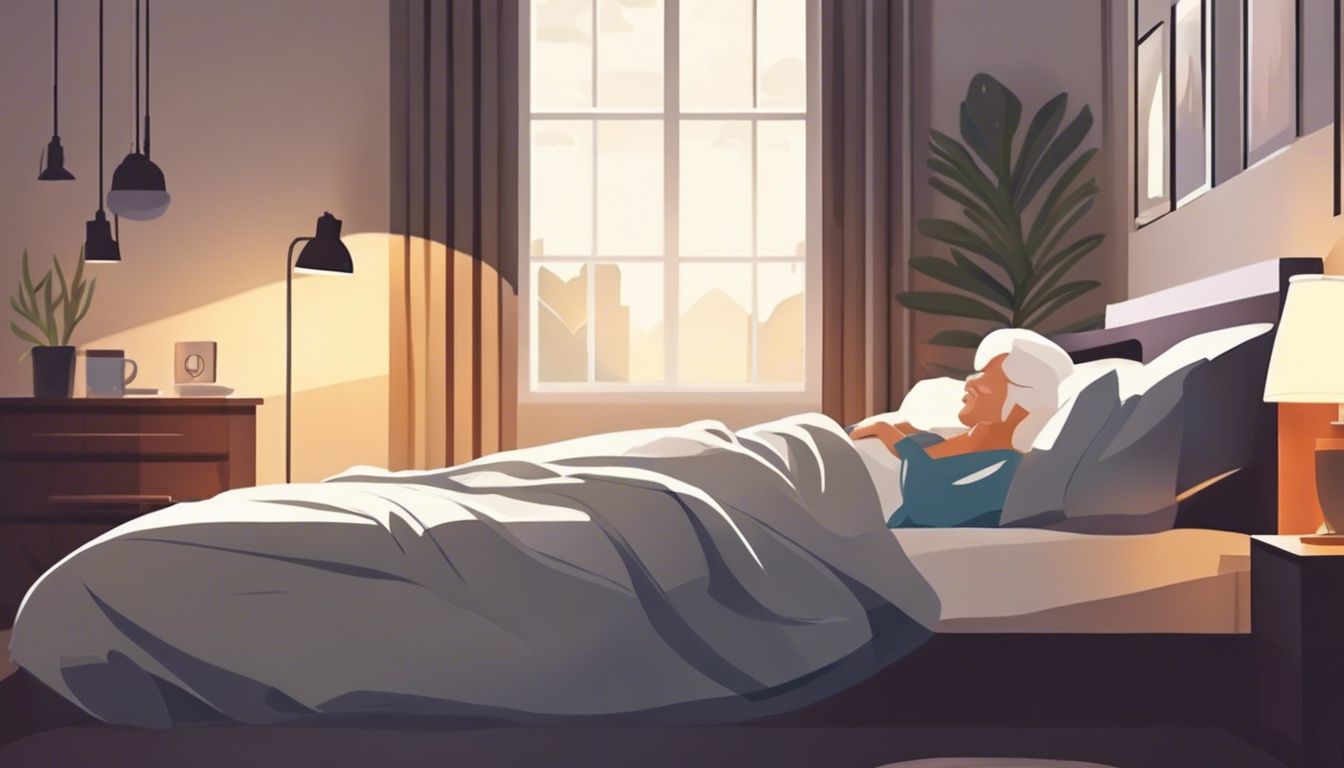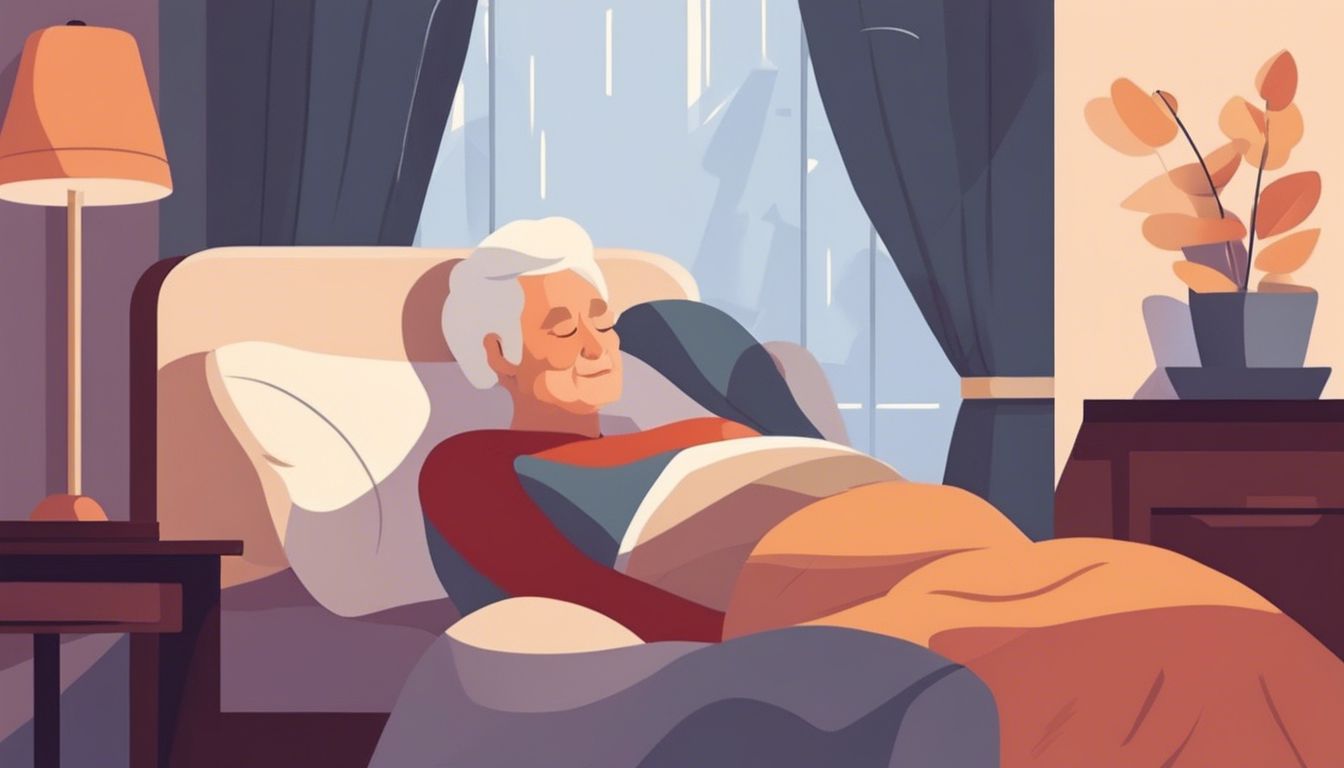Many seniors find sleeping hard. Up to 48% of older adults have insomnia. This post explains why and how to help them sleep better. Keep reading for tips.
Key Takeaways
- Many seniors struggle with sleep because of health problems like Alzheimer’s, heart conditions, and arthritis. These issues cause pain or make it hard to breathe at night.
- Stress and medicines also affect how well older people sleep. Up to 40% take five or more medications which can have side effects that disturb rest.
- Aging changes sleep patterns. Older adults often feel sleepy early in the evening and wake up too soon in the morning. They don’t spend as much time in deep or REM sleep.
- Problems like insomnia, sleep apnea, and restless legs syndrome are more common in older adults. These conditions make it tough for them to get good rest.
- Simple steps can improve senior sleep. Keeping a regular bedtime, making bedrooms dark and cool, staying active during the day, and avoiding naps help seniors rest better at night.
Common Causes of Sleep Issues in Seniors
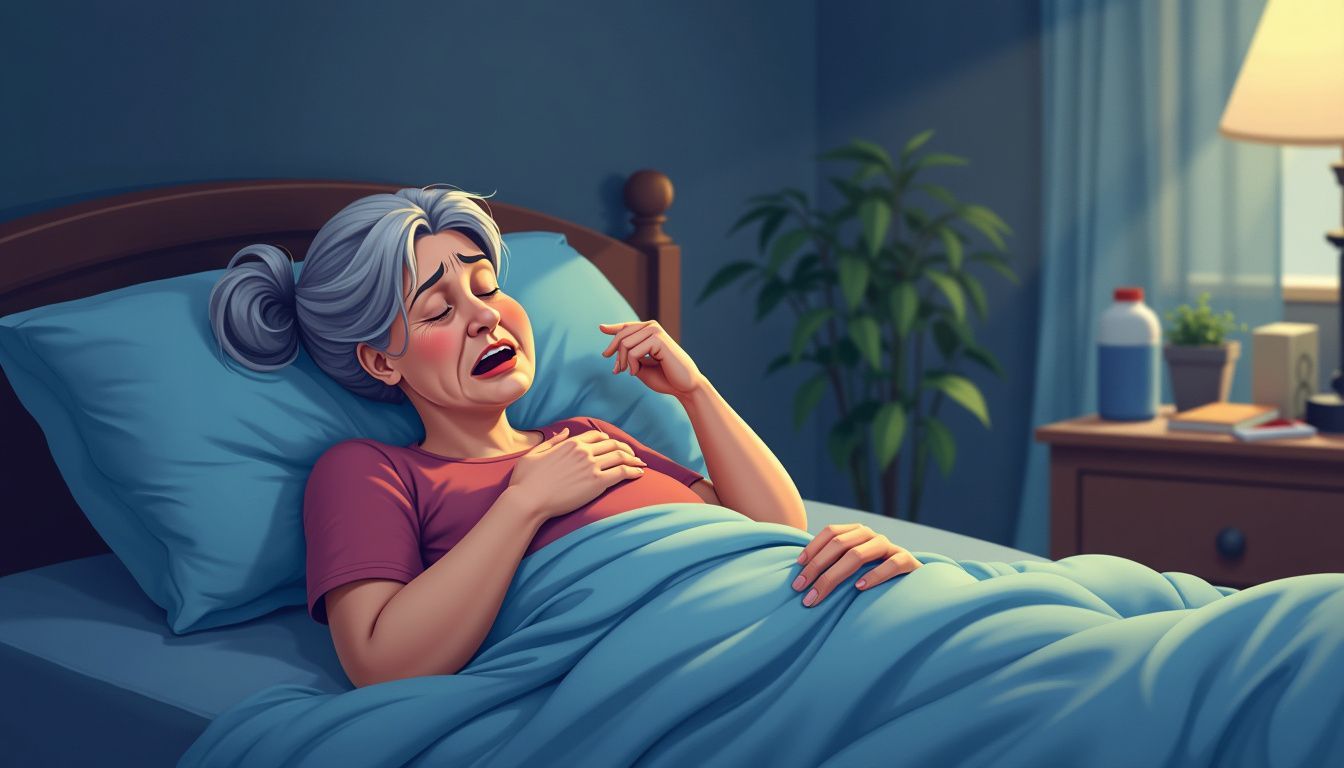
Seniors face sleep problems for a few reasons. Health troubles, stress, the pills they take, and where they sleep can all mess with their rest.
Physical health conditions
Many seniors face sleep problems due to physical health conditions. Alzheimer’s disease, heart failure, arthritis, and diseases of the brain and nervous system play big roles. These conditions cause pain or discomfort, making it hard to fall asleep or stay asleep through the night.
For example, arthritis brings joint pain that can wake a person up.
Another issue is sleep apnea. It stops breathing briefly during sleep because airways get blocked. This leads to poor sleep quality and daytime tiredness. Also, conditions like diabetes can change how the body handles sugar, affecting sleep patterns as well.
So, managing these health issues is key to improving sleep among older adults.
Psychological factors and stress
Moving from physical to mental, it’s clear that the mind plays a big role in sleep. Stress, depression, and anxiety can make sleeping hard. Seniors often feel these troubles deeply.
They worry about health or losing loved ones. These thoughts keep them awake.
Stress affects sleep too. It comes from many places – money problems or family issues. For some elders, memories of past events cause stress or sadness which disturbs their sleep patterns.
Solutions might include talking about worries or practicing relaxation techniques like deep breathing and meditation to calm the mind before bed.
Medication side effects
Stress and health issues often lead seniors to use various sleep aids. Yet, these medicines can have side effects. Up to 40% of adults over 65 take five or more medications. The FDA has put stronger warning labels on some sleep drugs.
People should not drink alcohol while taking these pills.
These medicines might help with sleeping but they can also cause problems like feeling tired during the day, trouble staying awake, and many more. For example, sleeping pills could make it hard for someone to wake up fully in the morning.
This shows that while trying to fix one problem, another might appear because of medication side effects.
Environmental disruptions
Noise, light, and temperature can stop seniors from sleeping well. Too much noise can make it hard for them to fall asleep or stay asleep. A room that’s too bright stops deep sleep.
If the room is too hot or too cold, it’s tough for them to be comfortable. Making their sleep environment quiet, dark, and at a good temperature helps them sleep better.
Bedrooms should be calm places without distractions. TVs and phones in the bedroom can disrupt sleep cycles. Using blackout curtains and sound machines creates a better space for sleeping.
Keeping the room cool but not cold gives them the best chance of resting well through the night.
Impact of Aging on Sleep Patterns
As we get older, our sleep patterns shift dramatically—our internal clocks change, leading to earlier bedtimes and wake-up times. This change affects the quality and amount of rest we get.
Aging can lead to lighter sleeping stages, making us more likely to wake up during the night. Plus, older adults spend less time in deep sleep and REM sleep—the phases that help refresh the brain.
Curious about what you can do to improve your or a loved one’s sleep? Keep reading for actionable tips.
Changes in the circadian rhythm
Older adults often face sleep trouble because their circadian rhythms shift. This internal clock tells us when to sleep and wake up. With age, this clock changes, causing older people to feel sleepy earlier in the evening and wake up earlier in the morning.
The result is less sleep at night.
Mental and physical health problems can make these changes worse. Stress, chronic pain, or needing to go to the bathroom at night disturb sleep too. All these factors lead to shorter and more broken-up sleep for seniors.
Reduction in sleep quality and duration
As seniors age, their bodies make less melatonin. This change makes it harder for them to sleep well. They spend fewer hours in deep sleep stages, which are key for feeling rested.
Older adults also wake up more often during the night. Many say they don’t sleep as long or as deeply as they used to.
These changes can lead to trouble falling asleep and staying asleep, known as insomnia. Next, we look at specific sleep disorders like insomnia that affect older people more often.
How Aging Affects Sleep Patterns
Aging changes how we sleep. Our bodies make less melatonin, making it harder to fall asleep. We might wake up more because of increased nighttime urination or due to shifts in our sleep-wake cycle.
Also, 25% of older adults take naps during the day which can make sleeping at night harder.
Older people face challenges in getting deep, restful sleep. Their sleep often becomes lighter and more broken up. Conditions like restless legs syndrome and insomnia become more common as we age, adding to trouble at bedtime.
This shift means seniors may not get enough quality sleep they need for good health.
Specific Sleep Disorders Affecting Older Adults
Older adults often face sleep problems like insomnia, sleep apnea, and restless legs syndrome. These issues can make sleeping tough, affecting their daily life.
Insomnia
Insomnia is a big issue for many older adults. They find it hard to fall asleep or stay asleep at night. This problem gets worse with age. Causes are many, like stress, health issues, and drinking caffeine or alcohol.
Even smoking can make it hard to sleep.
Medications and other sleep problems also lead to insomnia. Many rely on sleep aids but still feel tired in the day. They may get irritable too. Tips include setting a regular bedtime and creating a calm place to sleep.
Sleep apnea
Moving from insomnia, we find sleep apnea as another big problem for older adults. It makes their sleep broken and leaves them tired during the day. This condition means the person stops breathing for short times at night.
It’s more common in seniors and gets linked with serious health issues like heart disease and diabetes.
Doctors use a tool called continuous positive airway pressure (CPAP) to help with this issue. Sleep-disordered breathing, such as obstructive sleep apnea, rises with age. This increases risks of daytime drowsiness and fragmented sleep among seniors, making it hard for them to stay awake or alert throughout the day.
Restless Legs Syndrome (RLS)
Restless Legs Syndrome (RLS) affects many older adults. It makes their legs feel uncomfortable, especially at night. They feel like moving their legs to stop the uneasy sensations.
This can lead to trouble falling asleep and staying asleep.
Medicines, chronic diseases, and lifestyle factors can cause RLS. Solutions include changing medicines or habits that make RLS worse. Good sleep hygiene helps too, like keeping a regular sleep schedule and making the bedroom restful for sleeping.
Practical Tips for Improving Sleep in Seniors
To help seniors sleep better, setting a regular bedtime and waking time matters. Making the room dark, quiet, and cool can also improve sleep quality.
Establishing a regular sleep schedule
Making a regular sleep schedule is key. Go to bed only when tired, and get up if unable to sleep after 20 minutes. This routine helps the body know when it’s time for sleep. Keep wake-up times consistent, even on weekends, and avoid naps during the day.
A steady schedule improves overall sleep quality.
Next, focus on creating a peaceful sleep environment. This means making the bedroom quiet, dark, and cool….
Optimizing the sleep environment
Making the bedroom quiet and dark helps seniors sleep better. Keep the temperature below 75°F. Only use the bed for sleeping to avoid distractions. This keeps their mind set on rest.
Electronics should stay out of this space because screens can disturb sleep.
Safe sleeping setups are key too. Reduce fall risks by arranging furniture and rugs securely. Each step makes it easier for them to get into bed safely and aids in preventing waking up during the night due to discomfort or safety concerns.
Lifestyle adjustments and relaxation techniques
Seniors can change their daily habits to sleep better. They should exercise regularly and eat healthy foods. This helps the body feel tired at night and ready for bed. It’s also good to avoid things like tobacco and caffeine because they make it hard to sleep.
Creating a calm bedtime routine is another way seniors can get more rest. This means doing quiet activities before bed, like reading or listening to soft music. If they can’t fall asleep in 20 minutes, they should try something calm until feeling sleepy again.
Keeping the bedroom just for sleeping helps too, making it easier to relax when it’s time to sleep.
Conclusion
Sleep gets harder for older adults. Their bodies change, making deep sleep rare and wake-ups common. Health problems like heart issues, Alzheimer’s, or depression can steal sleep too.
Medicines might disturb it further. Plus, their daily rhythms shift, messing up night and day cycles. Simple steps help—set a sleep time, make the bedroom quiet and cool, and stay active during the day.
These actions can lead to better rest at night.
For more detailed insights into how aging specifically alters sleep patterns, visit our in-depth article here.
FAQs
1. What causes seniors to have trouble sleeping?
Seniors often face sleep disturbances due to various factors like medical conditions, lifestyle habits, and changes in sleep architecture with age.
2. Can mental health affect a senior’s sleep pattern?
Absolutely, mental health plays a significant role in sleep. Anxiety can cause difficulty falling asleep or staying awake – leading to chronic insomnia.
3. How does physical activity influence an older adult’s sleep?
Physical activity can improve stages of sleep and reduce daytime napping for seniors. However, excessive physical activity could lead to feelings of pins and needles or tingling that disrupts their normal sleep patterns.
4. Are there specific disorders related to the elderly having insufficient sleep?
Yes, periodic limb movement disorder (PLMD) is common among the elderly causing involuntary movements during non-rapid eye movement stage disturbing total sleep time.
5. Is medication recommended for seniors who struggle with disrupted sleep?
Sleep medicine might help but it should be used cautiously due to potential dependence and withdrawal issues when stopped abruptly; always consult a professional in Sleep Medicine before starting any medication regime for better alertness during daytime.
6. Do lifestyle habits contribute to poor quality of rest in older adults?
Certainly! Habits like nicotine use or working night shifts can exacerbate problems like nocturia which leads to fragmented rest periods resulting in excessive daytime tiredness according to National Sleep Foundation.
